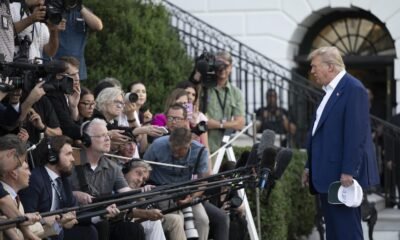border
Trump’s Bold Move to Disrupt International Trade Amidst ‘Unfair’ Relationships

President Donald Trump announced a major shift in U.S. trade policy Thursday, criticizing existing trade relationships as “unfair” and proposing significant increases in tariffs, even targeting foreign allies. During a press briefing in the Oval Office, Trump emphasized, “Tariffs are good; tariffs are great, actually.”
The new initiative, dubbed the “Fair and Reciprocal Plan,” aims to address perceived longstanding imbalances in international trade. The administration contends that while the U.S. maintains one of the most open economies globally, other nations restrict access to American exports. This lack of reciprocity has led to an annual trade deficit, which federal officials claim endangers both economic and national security.
In an effort to rectify these issues, Trump called for federal agencies to produce reports assessing trade relationships with various countries. These insights would enable the administration to introduce “reciprocal tariffs” tailored to each partner, regardless of whether they are allies or rivals.
Georgetown Law professor Gregory Shaffer criticized this approach, stating that implementing different tariff rates for various countries could undermine the established global trading system. He remarked, “This is the most radical shift that he has announced because it completely undermines the international trading system.”
The White House has yet to specify a clear timeline for the implementation of these tariffs, but analysts predict that changes could begin as early as April.
Scott Lincicome from the Cato Institute countered the White House’s assertion that the U.S. has some of the lowest average tariff rates globally, suggesting instead that the U.S. ranks in the middle among developed nations. He warned that under a reciprocal tariff system, the U.S. may be compelled to lower tariffs on manufactured goods from key trade partners like Europe and Canada.
Trump argued that countries with higher tariffs have an unfair trade advantage. However, Cato Institute associate director Colin Grabow highlighted the benefits of lower tariffs, explaining that they could result in cheaper goods for American consumers. “We should view them as a favor that we do to ourselves to improve our own competitiveness,” he stated.
Experts caution that Trump’s tariff plan may lead to greater financial strain on consumers and businesses. David Henig from the European Center for International Political Economy warned that increasing tariffs would likely drive up prices and complicate administration processes for import businesses, which would ultimately affect consumers.
The potential for upheaval in global trade markets also raises concerns. Shaffer expressed that uncertainty could stall pricing, employment, and investment in the near term. He also noted that trade conflicts could compromise international economic cooperation, complicating future crisis responses.
The reciprocal tariff proposal marks the latest development in ongoing trade tensions since Trump returned to the presidency. Earlier this week, he reinstated the steel and aluminum tariffs of 2018 and imposed an additional 10% tariff on Chinese imports.


















